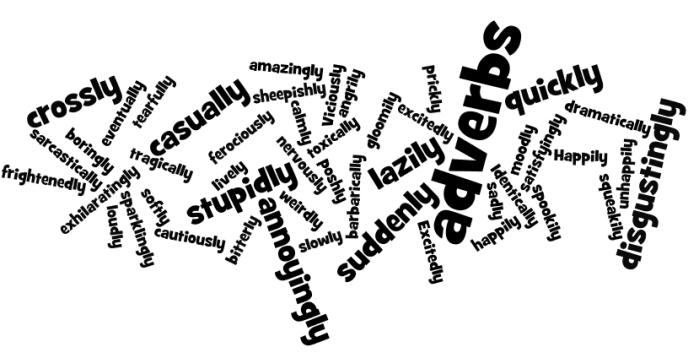Adverb-phobia? Surprisingly, there is such a thing. (Did you see what I did there? 😉 ) In the following blog post, author Simon Dillon brings up the issue which is apparently driving the writing experts crazy.
In writing, there are fads, and this one joins a long list of no-no’s:
1. Don’t tell the story; show it.
2. Don’t use too many words; you’re on a “word budget.”
3. Don’t be redundant. (Word budget again.)
4. Don’t use words like “very” or “feel.”
5. Don’t open with a dream, alarm clock, or dialog.
6. Don’t overuse dialog.
7. Don’t use many adjectives to explain things. (Show, don’t tell again.)
8. Don’t have a backstory.
9. Don’t start sentences with conjunctions.
10. Don’t use contractions; use contractions.I don’t know about other writers out there, but I’m getting tired of the so-called “experts” telling me what I can and cannot do. In certain cases, they may have a point, but these rules are causing far too much conformity in popular fiction these days. Perhaps being superfluous or redundant can be a good thing, driving a point home. Perhaps it’s okay to tell the story (we are storytellers, are we not?), or to cut off sentences for effect, or to use those dreaded adjectives and adverbs.
Let them say what they will, but if a story is entertaining, that’s what matters. No “expert” will suffocate my creativity.
Here’s what Simon Dillon has to say about it:
 One frequently reads writing advice to the effect that adverbs are the source of all evil. Some of these articles are so vehement I actually checked the Bible to see if adverbs were a result of Adam and Eve eating from the Tree of the Knowledge of Good and Evil in the book of Genesis.
One frequently reads writing advice to the effect that adverbs are the source of all evil. Some of these articles are so vehement I actually checked the Bible to see if adverbs were a result of Adam and Eve eating from the Tree of the Knowledge of Good and Evil in the book of Genesis.
My own, rather more liberal view on adverbs is simple: if you use them to clarify, no problem.
For example, in “Simon smiled happily” the “happily” is superfluous. On the other hand “Simon smiled cruelly” could work well, depending on the context of course. If Simon is busy sadistically torturing a victim, then “cruelly” would also be superfluous as his sadistic acts speak for themselves. On the other hand such a sentence could work if the expression turns a scene. Perhaps you think Simon is a good guy then all of a sudden he smiles…
View original post 55 more words

I take a simplistic view on all these rules. I am the storyteller. I have my own style of writing, maybe to the purist it’s incorrect but it is MY style. My rule is, ‘Rules are there to be broken.’
I doubt authors of old, i.e. H.G. Wells/Charles Dickens referred to the rules before putting pen to paper.
LikeLiked by 1 person
Absolutely, Maureen. I would never discourage writers from learning the rules, especially when they’re just getting started. However, some of these ideas are getting to be ridiculous. Just for the heck of it, I opened up The Bell Jar and immediately came across an adverb. Then I flipped through A Tale of Two Cities, and there were more adverbs describing how the people spoke their dialog. Would these authors be criticized today?
LikeLike